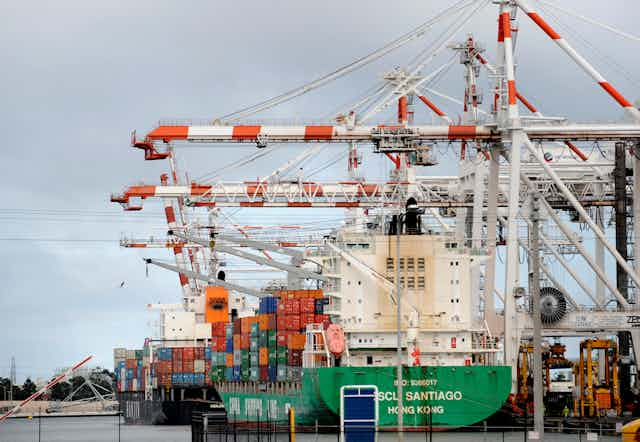Cash-strapped state governments are looking to sell assets, such as ports, to raise funds. In 2014, the New South Wales government sold the Port of Newcastle for A$1.75 billion. The Victorian government is setting up the Port of Melbourne for sale. And the Western Australian government is considering the sale of Fremantle Port.
These asset sales are aimed to meet short-term budget pressures. But will they help us in the long term?
Privatisation – with strings attached
Ownership matters. It changes incentives. So, in general, a private firm will behave differently from an (otherwise identical) government-owned business.
However, at least since the classic 1986 paper by Kay and Thompson, two key principles of privatisation have been well recognised in economics:
Effective competition is more important for consumers than ownership; and
Governments will often limit competition when privatising assets even though this harms consumers.
The current spate of privatisations reaffirm these principles. The Port of Melbourne sale is “stuck”, with disagreement between the government and opposition about compensation payments. In formal terms:
The leaseholder may be compensated if a second port is developed by the State during the lease term and takes international container capacity that would have been accommodated at the Port of Melbourne away from it.
In other words, no competition without compensation.
Similar issues have been raised in the privatisation of Fremantle Port, if an alternative port is developed at Kwinana. In NSW, coal miner Glencore is engaged in an access dispute with the recently privatised Port of Newcastle over claims of excessive pricing.
Limitations on competition are nothing new in Australian privatisations. For example:
As part of the government sale of Sydney (Kingsford Smith) Airport in 2002, the purchaser was provided with the opportunity to develop and operate a second major airport in the Sydney region, within 100 kilometres of the Sydney GPO.
In other words, the owner of Sydney airport has first right of refusal to develop any “competing” airport.
Competition restrictions are a hidden tax
Governments limit competition as part of a privatisation for two main reasons. The first is to protect existing management and workers and limit organised opposition to the sale. Existing employees are less likely to oppose privatisation if their cosy government jobs will simply be changed into cosy private sector jobs.
The second reason is to increase sales revenues.
This second rationale is well known in Australia. A business that faces limited competition will make more profits in the future than a business that has to face vigorous and effective competition.
So private buyers are willing to pay more for a government business when anti-competitive guarantees are put in place. So by limiting future competition, the government makes more sales revenue today.
But this extra revenue is really just a hidden future tax. Competition means lower prices and/or better products. It makes consumers better off, but harms incumbent firms.

Who suffers from the failure to build a second airport in Sydney? The public who would otherwise get cheaper, more convenient flights. So Sydney flyers are still paying today for the higher sale price of Sydney airport in 2002.
Who suffers when importers’ costs rise due to a lack of port competition? The public who pay more for clothes, cars and all other imported products.
So if the Port of Melbourne or Fremantle Port is sold at a higher price with competition restrictions, Australian consumers will be paying higher prices in the future because of these restrictions.
Put simply, privatisation with competitive restrictions is a tax on tomorrow’s consumers to give the government more money through the sale process today.
So it is unsurprising that the competition watchdog has been arguing against these competition restrictions. Unfortunately, the lure of a quick buck to feed into state coffers has largely overwhelmed these arguments.
Thinking long-term
Short-sighted revenue maximisation has not always governed privatisations. The Victorian electricity asset sales in the 1990s were designed to improve ongoing competition, with government-owned monopolies broken up before they were sold. The Kennett government still got a good price for the assets.
While the competitive reforms only partially worked because the monopoly network assets still need close (and costly) regulation, these privatisations have not led to higher prices for consumers.
So Victoria got its budget savings without a hidden tax on consumers. Other state governments should follow this example.
The issue is broader than simply a short-term trade-off between revenue and hidden taxes. It also affects voters’ views of asset sales.
Selling government businesses is not popular. However, what is (and is not) government-owned changes over time. In Australia’s not-too-distant past, governments have owned banks, shipping companies, oil refineries, brickworks, pipeworks, flourmills, fishing trawlers, timberyards, butter factories and clothing manufacturers, to name but a few.
These government businesses all seemed “a good idea” at the time. Some went bankrupt. Others were sold as it was realised that government ownership in these areas hurt, not helped, the economy.
Similarly, new government businesses develop over time. The National Broadband Network (NBN) is an obvious recent example.
To maintain a vibrant economy, governments need to be able to move into and out of sectors as the economy and technology change. By undermining the privatisation process through hidden taxes, today’s governments will limit the options for tomorrow’s governments.
If voters (rightly) are sceptical of privatisations, then governments lose flexibility. In the long term, this will be the biggest cost of the current grabs for cash.

